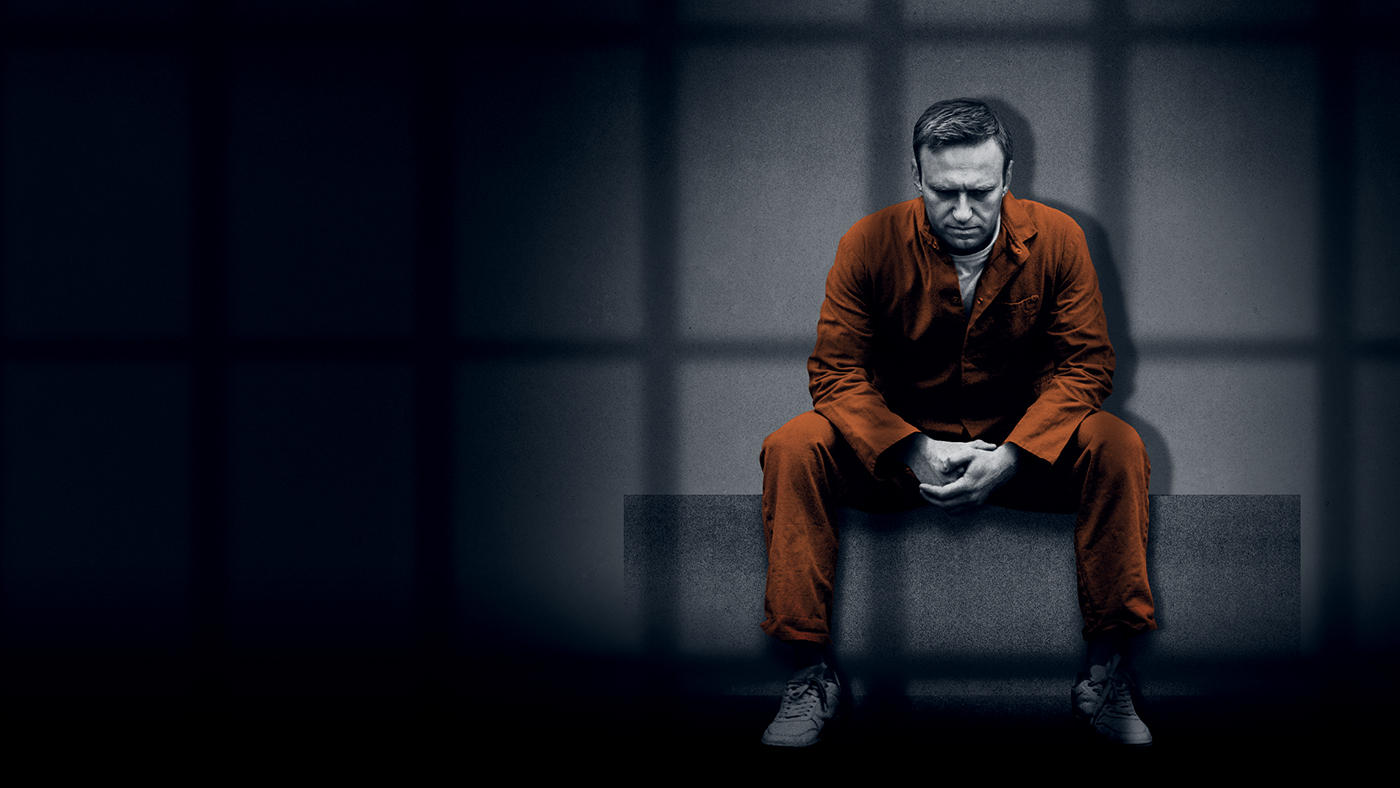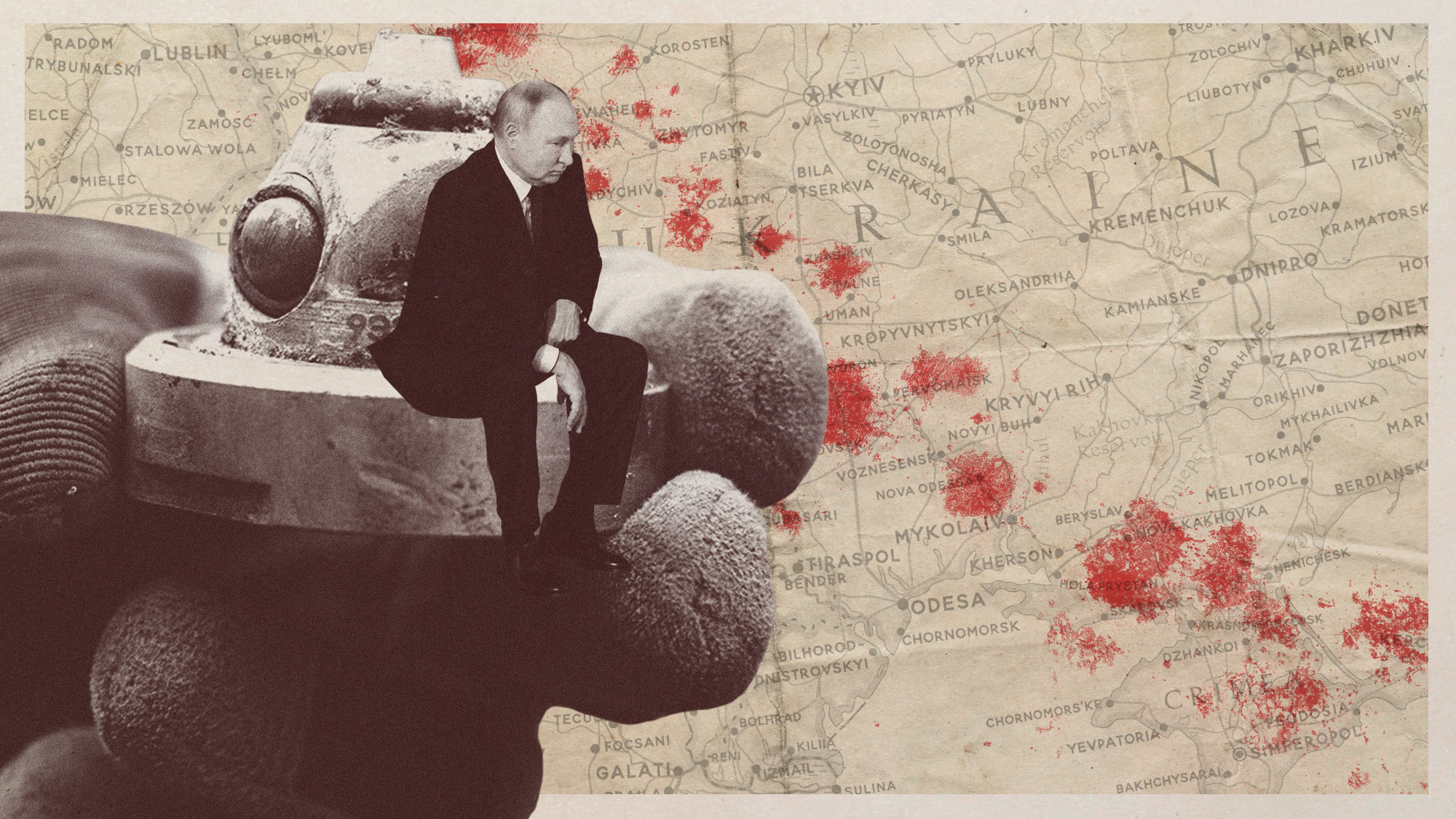Is Alexei Navalny being slowly killed in captivity?
Russian opposition leader and Putin critic reportedly suffering severe stomach pains and weight loss amid poisoning allegations

A free daily email with the biggest news stories of the day – and the best features from TheWeek.com
You are now subscribed
Your newsletter sign-up was successful
Jailed Russian opposition leader Alexei Navalny is being gradually poisoned behind bars, his allies claim.
The prominent critic of Vladimir Putin is being held at the maximum security IK-6 penal colony at Melekhovo, about 155 miles east of Moscow, for charges including embezzlement and contempt of court. An ambulance was called there earlier this month after Navalny suffered severe stomach pains, but the 46-year-old was reportedly not given medication.
His supporters say that he has suffered ongoing pain and considerable weight loss in recent months, but that the prison authorities have refused to admit him to hospital. No updates have been given about Navalny’s condition but close ally and activist Ruslan Shaveddinov told The Guardian that the situation was becoming “critical”, adding: “Our theory is that they are gradually killing him, using slow-acting poison which is applied through food.”
The Week
Escape your echo chamber. Get the facts behind the news, plus analysis from multiple perspectives.

Sign up for The Week's Free Newsletters
From our morning news briefing to a weekly Good News Newsletter, get the best of The Week delivered directly to your inbox.
From our morning news briefing to a weekly Good News Newsletter, get the best of The Week delivered directly to your inbox.
What did the papers say?
In August 2020, Navalny was medically evacuated from Russia to Germany after being poisoned with the chemical nerve agent novichok in an alleged attack that he and the US State Department blamed on Russian security agents. The Kremlin denied any involvement.
After returning to Russia in January 2021, Navalny was detained for violating his parole for a 2014 conviction for alleged embezzlement – a move “widely regarded as a politically motivated campaign to silence” him, said The New York Times. In what Amnesty International called a “sham” trial, Navalny was slapped with a two-and-a-half year prison sentence for parole violations, before being sentenced in March last year to a further nine years for additional fraud and contempt charges.
Navalny claims to have been “repeatedly placed in solitary punishment cells for up to 15 days at a time for trivial offences, such as introducing himself incorrectly, washing his hands too early in the morning, or having the top button on his prison uniform undone”, said The Washington Post. He is now serving his “13th stint in solitary confinement in a small, stuffy punishment cell”, with just a book and a cup, and an hour’s exercise a day in a small yard.
While in confinement, the opposition leader has “suffered acute stomach pains and seizures”, the paper continued, and lost more than 17lbs (7.7kg) in just over two weeks. His lawyer has “demanded toxicological and other medical tests”, and complained to the authorities, after the doctor who treated Navalny reportedly “gave no diagnosis and told him that everyone has health issues during spring”.
A free daily email with the biggest news stories of the day – and the best features from TheWeek.com
Ruslan Shaveddinov, a member of Navalny’s anti-corruption foundation, told the Financial Times last week that “it’s a sort of slow and methodical murder, happening in front of our eyes right now”. Navalny’s press secretary, Kira Yarmysh, told Reuters that the team “couldn’t rule out” the possibility of incremental poisoning.
This “might sound like paranoia”, Shaveddinov told The Guardian, “but after the novichok poisoning, it seems completely plausible”.
It is “hard to adduce an innocent explanation for a mysterious ailment” afflicting Navalny, said The Times’s leading article today. The Kremlin “must be held accountable” for his safety, and “Western governments should demand it”.
What next?
“To be a dissident, or even merely a dogged journalist, in Russia requires raw courage,” said The Times. Many have died in violent, unexplained circumstances, including reporter Anna Politkovskaya, who was “gunned down” in 2006, and Sergei Magnitsky, a lawyer killed in police custody in 2009.
Beyond Russian borders, former KGB agent Alexander Litvinenko was murdered with polonium in London in 2006. Former Russian intelligence officer-turned-UK double agent Sergei Skripal and his daughter ,Yulia, survived a novichok assassination attempt in Salisbury in 2018.
And today another opposition activist, Vladimir Kara-Murza, was sentenced to 25 years in jail for charges linked to his criticism of the Ukraine war. It is “the longest sentence an opposition figure has received so far”, said the BBC Kathryn Armstrong. Kara-Murza, who denied all the charges against him, reportedly told the closed court that “his trial reminded him of a Stalin-era show trial of the 1930s”.
Amid mounting concern about Navalny, The Times warned that even if he was not being deliberately poisoned, his life was in danger from the conditions of his imprisonment. He is “a prisoner of conscience being targeted by a rogue regime” willing to torture and murder those who oppose it.
Yet his “fate risks being overlooked” while Western countries focus on supporting Ukraine, the paper added. Relations between Russia and the West are “already at a nadir short of outright hostilities”, which is “entirely Mr Putin’s handiwork, and no good will come from tempering outrage at his treatment of a brave critic”.
Harriet Marsden is a senior staff writer and podcast panellist for The Week, covering world news and writing the weekly Global Digest newsletter. Before joining the site in 2023, she was a freelance journalist for seven years, working for The Guardian, The Times and The Independent among others, and regularly appearing on radio shows. In 2021, she was awarded the “journalist-at-large” fellowship by the Local Trust charity, and spent a year travelling independently to some of England’s most deprived areas to write about community activism. She has a master’s in international journalism from City University, and has also worked in Bolivia, Colombia and Spain.
-
 What to know before filing your own taxes for the first time
What to know before filing your own taxes for the first timethe explainer Tackle this financial milestone with confidence
-
 The biggest box office flops of the 21st century
The biggest box office flops of the 21st centuryin depth Unnecessary remakes and turgid, expensive CGI-fests highlight this list of these most notorious box-office losers
-
 The 10 most infamous abductions in modern history
The 10 most infamous abductions in modern historyin depth The taking of Savannah Guthrie’s mother, Nancy, is the latest in a long string of high-profile kidnappings
-
 New START: the final US-Russia nuclear treaty about to expire
New START: the final US-Russia nuclear treaty about to expireThe Explainer The last agreement between Washington and Moscow expires within weeks
-
 What would a UK deployment to Ukraine look like?
What would a UK deployment to Ukraine look like?Today's Big Question Security agreement commits British and French forces in event of ceasefire
-
 Trump peace deal: an offer Zelenskyy can’t refuse?
Trump peace deal: an offer Zelenskyy can’t refuse?Today’s Big Question ‘Unpalatable’ US plan may strengthen embattled Ukrainian president at home
-
 Vladimir Putin’s ‘nuclear tsunami’ missile
Vladimir Putin’s ‘nuclear tsunami’ missileThe Explainer Russian president has boasted that there is no way to intercept the new weapon
-
 How should Nato respond to Putin’s incursions?
How should Nato respond to Putin’s incursions?Today’s big question Russia has breached Nato airspace regularly this month, and nations are primed to respond
-
 Russia’s war games and the threat to Nato
Russia’s war games and the threat to NatoIn depth Incursion into Poland and Zapad 2025 exercises seen as a test for Europe
-
 What will bring Vladimir Putin to the negotiating table?
What will bring Vladimir Putin to the negotiating table?Today’s Big Question With diplomatic efforts stalling, the US and EU turn again to sanctions as Russian drone strikes on Poland risk dramatically escalating conflict
-
 Ottawa Treaty: why are Russia's neighbours leaving anti-landmine agreement?
Ottawa Treaty: why are Russia's neighbours leaving anti-landmine agreement?Today's Big Question Ukraine to follow Poland, Finland, Lithuania, Latvia and Estonia as Nato looks to build a new ‘Iron Curtain' of millions of landmines